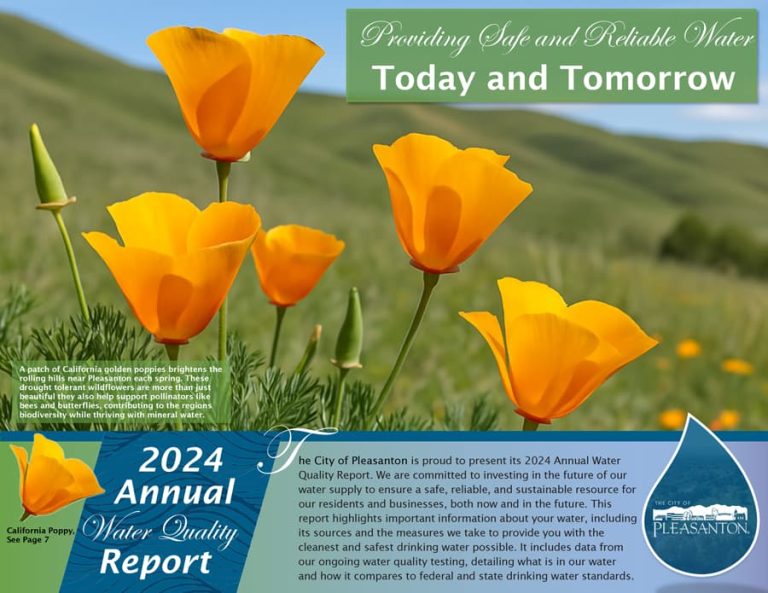Water Quality & Safety
The City of Pleasanton is dedicated to providing safe, clean, and reliable water to our customers. To achieve this, the City actively strives to comply with increasing regulatory mandates and to plan for the future.
Pleasanton’s water comes from the Zone 7 Water Agency, the Tri-Valley region’s water wholesale provider. While the City has historically used both groundwater and imported surface water, in 2022, the City’s groundwater wells were taken offline due to the detection of PFAS (per- and polyfluoroalkyl substances) above the required notification levels. The City has designated its groundwater wells for emergency use only and continues to sample and monitor its groundwater supply appropriately.
Your health and safety are our top priorities. Zone 7 and the City conduct regular water quality testing and monitor for various substances, including emerging contaminants like PFAS and naturally occurring elements. The City is committed to transparency and ongoing public communication as regulations evolve.
“Pleasanton is committed to delivering a safe, reliable, and sustainable water supply for residents and businesses—now and well into the future.”
Water Testing
As part of our commitment to health and safety, the City and Zone 7 routinely test all water supplies. Zone 7, which supplies all of Pleasanton’s drinking water, continuously monitors water quality at its two surface water treatment plants, conducting tests every four hours to ensure safe and effective treatment.
Additionally, the City monitors 48 sampling locations throughout Pleasanton’s water distribution system on a daily, weekly, and monthly basis to confirm compliance with State and Federal drinking water standards.
Each year, the City publishes an annual water quality report that highlights important information about our water, measures taken to provide the cleanest and safest drinking water possible, and data from our ongoing water quality testing. The report details what is in our water and how it compares to federal and state drinking water standards.
Below is a summary of our latest water quality report, frequently asked questions, and additional resources to help you understand how Pleasanton is protecting your drinking water.
Key Takeaways from the City’s 2024 Water Quality Report:
- The City and Zone 7 met or exceeded all water quality safety standards
- No detected violations of contaminants
- Average water hardness: Moderate
Water Quality Programs and Resources
2024 Annual Water Quality Consumer Confidence Report (CCR)
About This Report
This Consumer Confidence Report (CCR) was prepared in accordance with state health regulations, which require water suppliers to provide customers with important information about their drinking water. The report explains where Pleasanton’s water comes from, what it contains, and whether it met state and federal safety standards during the 2024 calendar year.
We are pleased to share that all required testing conducted in 2024 confirmed that Pleasanton’s drinking water met all applicable state and federal standards, with no violations. These standards are designed to protect public health by limiting both naturally occurring and human-made contaminants.
In addition to presenting water quality test results, this report highlights actions taken by the City of Pleasanton and Zone 7 Water Agency to ensure the continued safety and reliability of our water supply. It also provides details about ongoing system improvements, future water planning efforts, and opportunities for the public to stay informed and involved in local water issues.
Contact information for the City, Zone 7 Water Agency, and other relevant agencies is included at the end of this report to assist residents with questions regarding water billing, supply, or quality.
The City of Pleasanton remains committed to delivering safe, high-quality, and sustainable drinking water—today and into the future.
Prior Year Water Quality Reports
- 2023 Annual Water Quality Report
- 2022 Annual Water Quality Report
- 2021 Annual Water Quality Report
- 2020 Annual Water Quality Report
- 2019 Annual Water Quality Report
- 2018 Annual Water Quality Report
- 2017 Annual Water Quality Report
- 2016 Annual Water Quality Report
- 2015 Annual Water Quality Report
- 2014 Annual Water Quality Report

Addressing PFAS and Ensuring a Safe, Reliable Water Supply
Per- and poly-fluoroalkyl substances (PFAS) are a group of man-made chemicals, including PFOA and PFOS. PFOA and PFOS have been extensively produced in the United States since the 1940s. These substances have been synthesized for water and lipid resistance and used in products such as carpets, clothing, fabrics for furniture, paper packaging for food, non-stick cookware, and fire-retarding foam. Between 2000 and 2002, PFOS was voluntarily phased out of production in the U.S. by its primary manufacturer.
According to the Environmental Protection Agency (EPA), exposure to certain PFAS can lead to adverse health effects in humans. Until recently, PFAS were considered unregulated contaminants of emerging concern in drinking water due to potential health impacts and their tendency to accumulate in groundwater. However, in 2024, the EPA established federally enforceable drinking water standards (Maximum Contaminant Levels, or MCLs) for several PFAS compounds, including PFOA and PFOS. The EPA had previously issued health advisories associated with PFAS findings. However, the new federal MCLs now require public water systems to monitor for these substances and take corrective action if levels exceed the established limits.
In addition, the State Water Resources Control Board (SWRCB) in California has issued its own Notification and Response Levels for PFAS. It is adopting state-specific MCLs that may exceed federal requirements.
Zone 7 and the City actively monitor PFAS levels in all water supplies and have taken measures to ensure the delivery of safe drinking water to customers. In 2022, after detecting PFAS in the City of Pleasanton’s groundwater wells below the required response level, the City decommissioned these wells for drinking water use. All wells are restricted to emergency use only and are regularly tested and monitored.
After taking its wells offline, the City conducted a Water Supply Alternatives Study to determine the best way to ensure a long-term, safe, and reliable water supply. In 2024, the City Council approved an agreement to partner with the Zone 7 Water Agency on Phase 1 (Feasibility) of constructing two new wells as part of a Joint Groundwater Wells Project. This project is currently being studied and designed as a potential long-term alternative to mitigate the impacts of PFAS for the City of Pleasanton and Zone 7. To learn more, visit the Joint Groundwater Wells Project webpage.
